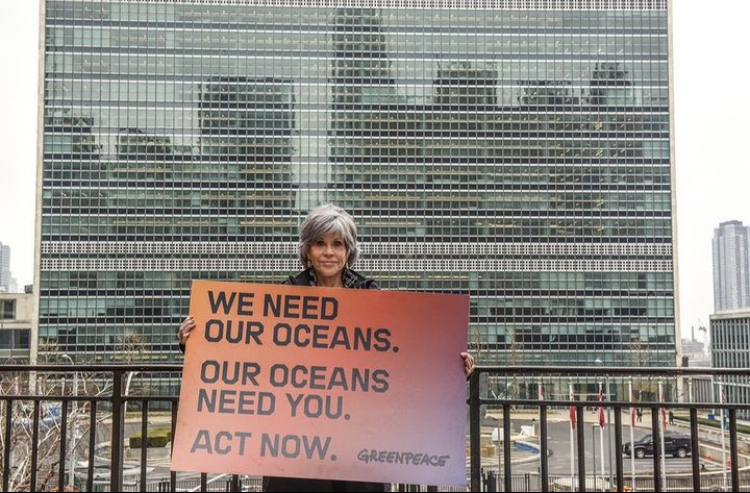
Jane Fonda has always had an affinity for the ocean.
Growing up in Santa Monica, she told AP News she would go to the beach nearly every day when it was warm enough. Now, the 85-year-old actor and activist has used her influence to help protect those beloved waters.
Following 10 years of negotiations, the United Nations has reached an agreement on the High Seas Treaty, which aims to turn 30% of the world’s oceans into protected marine sanctuaries by 2030. This comes shortly after Fonda — who has been working with Greenpeace on protecting our oceans for almost four years – traveled to the United Nations headquarters in New York City to deliver 5.5 million signatures from 157 countries calling for a strong ocean treaty.
Fonda urged UN negotiators to “set aside the politics, the special interests, and the inertia that tends to drag big, bold ideas into the ground,” and to “get this done – for every life on Earth,” per a release from Greenpeace.
Delivering the petition alongside Fonda was Anta Diouf, a community leader from Senegal. “We female fish processors and the fishing communities we belong to are facing real challenges because of fish resource scarcity,” Diouf told UN negotiators, before urging them to “conclude this treaty for the sake of protecting our oceans, lives and jobs.”
After years of disagreements on funding and fishing rights, this is the first successfully reached international agreement on ocean protection since the UN Convention on the Law of the Sea in 1982, which allowed nations to use international waters, or “the high seas,” for fishing, shipping and research purposes. But in that agreement, only 1.2% of these waters were protected.
Due to plastic pollution, overfishing, and industrial activity in these waters — as well as climate change — nearly a tenth of marine life is threatened with extinction, according to the latest Red List of Threatened Species, making the matter more pressing than ever.
“I’ve swum with some of the most magnificent creatures, and I know that they may very well be more intelligent than me,” Fonda, who recalled scuba diving at the Great Barrier Reef in Australia and the Galápagos Islands in Ecuador, told a news conference. “And I love them, and I think that we should all understand that we’re talking about saving the last great wild animals that are hunted for food.”
The day before the agreement was reached, Fonda took to Instagram to urge UN negotiators to “use your power for good” and to “please deliver” on preserving those waters, and the creatures that call them home. Now that world’s first treaty designed to protect the ocean’s biological diversity is signed, we can say this: the UN heard Fonda and the millions of signatories she unified loud and clear.



